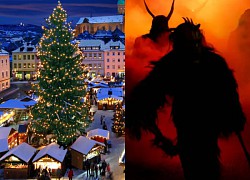The origin and deep meaning of the objects that appear on Christmas Day to help you love Christmas more

3 | 0 Discuss | Share
On Christmas day, not only Catholic countries but many countries around the world, especially young people, are bustling in the atmosphere of celebrating Christmas or Christmas. So what does Christmas mean?
Every year, Christmas will take place on the night of December 24 to the end of December 25 according to the Gregorian calendar. Christmas, also known as Noel or Christmas, is a major holiday worldwide. However, many people still wonder where the name Noel comes from and why Christmas is called Noel.
Why is Christmas called Noel?
The word "Christmas" is said to come from the title Emmanuel, the ancient Hebrew word for "God with us", recorded in the Gospel of Matthew.
There is an opinion that it was originally the word Noël, or the older form Naël, derived from the Latin word nÄtÄlis meaning day of birth, used to refer to the day of God's birth.
Some people also believe that Noël comes from the word "nouvelles", French meaning new news. Its English root is "nowel", which means "sound of joy". "Noel" represents the good news that Jesus came to earth to forgive and save humanity.
The word Noel was commonly used in the Middle Ages in Europe. French and English Christmas carols use this word when referring to the birth of Christ.
What does Christmas mean?
Christmas day in English is called Christmas. In particular, "Christ" is the title of Jesus, derived from "ΧÏιστός" (pronounced Khristós) in Greek, transliterated in Vietnamese as "Christ" or "Christian", meaning the one who is oil. And "mas" means mass. Therefore, Christmas's original meaning is the holy day of Christ.
When writing, many people use Xmas instead of Christmas, meaning "Christ" is replaced by the letter X. The reason is also because the word Christ in English is derived from "ΧÏιστός" in Greek. Writing Xmas is actually an abbreviation, but uses the first consonant of the Greek word Christ.
Scholars have not confirmed when the spelling Xmas was applied. Documents show that this phrase began to be popular from the first century AD, some researchers believe that it was popular from the 13th century.
By the 15th century, the symbol Xmas was widely used instead of Christmas. After the printing press was born in 1436, the Catholic church used it to print theological documents and books. Printing costs are very expensive, so to save money, people try to shorten it and the word Xmas is used instead of Christmas in printed copies.
After Xmas appeared in official religious texts, this spelling became more widespread.
Who is Santa Claus?
In Vietnamese, this name dates back to the French colonial period, originating from the French calling Le Père Noel (Father Noel, priest Noel); From then on, Vietnamese people call it "Santa Claus".
In English, Santa Claus is called Santa Claus, derived from the Dutch word Sinter Klaas, in which Santa or Sinter means "saint", and Claus, Klaas comes from the name Saint Nicholas, a real character. , was a Greek bishop who lived in the fourth century. He loved the poor very much and spent his whole life serving God.
Once, when he met three young girls who had no suitors because their father was too poor, he immediately took three bags of gold and secretly put them in the three girls' room. Thanks to that, they got married and lived very happily. It is rumored that surprise gifts are brought by Saint Nicholas and it is he who always brings gifts to children at Christmas.
Origin of Christmas
According to Christian belief, Jesus was born in Bethlehem, in Jewish Judea (today a city in Palestine) sometime between 7 BC and 2 AD. At that time, Judea was under the rule of the Roman Empire.
The story of Jesus' birth is described in the New Testament as follows: In the city of Nazareth, the virgin Mary was betrothed to the carpenter Joseph. They are all descendants of King David, the great king of the Jews. One day, the angel Gabriel appeared before Mary, announcing: "You will be given a son named Jesus. He will be great and will be called the Son of the Most High. God will give him his throne. David your ancestor. You will reign over the house of Israel forever, and your kingdom will have no end."
Mary told Joseph everything, and she became pregnant even though she was still a virgin. While Joseph was wondering, the angel of the Lord also appeared in a dream to announce God's grace, so he no longer worried and married Mary.
One day, the couple set off to their hometown of Bethlehem, 110 km away, to register their names on the tax list as ordered by the Roman emperor Augustus. When he arrived, the inns were full, so Joseph had to take his wife to rest in a barn. At midnight, Mary went into labor and gave birth to Jesus here. Joseph found a wooden trough that held animal feed, cleaned it thoroughly and lined it with dry grass to make a cradle for his new born child.
At that time, only the shepherds were awake in the pasture. Suddenly a bright light spread throughout the sky, an angel appeared to tell them great news: "Today in the city of David is born for everyone a Savior, who is Christ. You will find him. , a baby wrapped in swaddling clothes, lying in a manger."
The shepherds obeyed and found the Baby Jesus on a manger in a barn. They told Mary and Joseph everything they had seen in the field. When they left, their hearts were still excited, everyone they met told about the strange things they saw that night.
Although the date of Jesus' birth is unknown, the church in the early fourth century fixed his birth date as December 25, corresponding to the winter solstice on the Roman calendar.
Christmas is a popular holiday but not everyone knows the strange story behind it  Snow21:45:49 23/12/2023Christmas is one of the most popular holidays globally, even in countries with few Christians. Each place will have its own organization and contain many interesting and equally strange stories.
Snow21:45:49 23/12/2023Christmas is one of the most popular holidays globally, even in countries with few Christians. Each place will have its own organization and contain many interesting and equally strange stories.

3 | 0 Discuss | Share

4 | 1 Discuss | Share

2 | 1 Discuss | Share

5 | 1 Discuss | Share

1 | 1 Discuss | Share

3 | 1 Discuss | Share

4 | 1 Discuss | Share

2 | 1 Discuss | Share

4 | 1 Discuss | Share

3 | 1 Discuss | Share

4 | 1 Discuss | Share

0 | 1 Discuss | Share










3 | 1 Discuss | Report